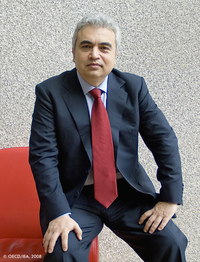Policy Alternatives Research Institute (PARI) / Global Leader Program for Social Design and Management (GSDM) Symposium
GSDM 47th Platform Seminar
The 80th Public Policy Seminar
Global Energy Trends
| [Date] | Tuesday, February 17, 14:20- (Tentative) |
|---|---|
| [Venue] | Ito Hall, Ito International Research Center, Hongo Campus of the University of Tokyo |
| [Language] | English/Japanese simultaneous translation |
| [Hosted by] | Policy Alternatives Research Institute (PARI) / Global Leader Program for Social Design and Management (GSDM), the University of Tokyo |
| [Co-hosted by] | Graduate School of Public Policy (GraSPP), the University of Tokyo |
| [Supported by] | Economic Research Institute for ASEAN and East Asia (ERIA) |
In November 2014, the International Energy Agency (IEA) announced the “World Energy Outlook (WEO) 2015”. With a focus mainly on nuclear power and energy issues in sub-Saharan Africa, the WEO has generated particular interest this year owing to uncertainties regarding the direction that the global economy will take and regarding the geopolitics of the Middle East. While previous WEOs had not looked beyond the year 2030, the WEO 2015 will be the first to present the outlook for a period up to 2040. In addition, it displays a strong sense of crisis in the energy market due to the conflicts in the Ukraine and the Middle East. Moreover, in addition to a strong focus on nuclear energy, the outlook presents a number of messages for Japan, providing detailed analyses of the natural gas market and the current situation regarding various types of renewable energy.
With the uncertain future of the global economy today, the global oil market is experiencing significant changes that are having a significant economic impact. In Asia, it has become clear that the Chinese economy is decelerating, and the new governments in India and Indonesia that came to power are already facing serious challenges. With the initiation of the ASEAN Economic Community (AEC), this year will be a major turning point for the energy sector in Asia.
For this symposium, we invited Dr. Fatih Birol, a WEO representative, and he will talk about the current situation and outlook on global energy, including in Asia. Through the panel discussion and the Q and A session, we hope to gain a better understanding of the global energy situation with a focus on Asia, policy implications, and the effects on Japan.
Program (Tentative)
| 13:00- | Registration |
| 14:20- | Opening Speech Prof. Hideaki Shiroyama Dean, Graduate School of Public Policy (GraSPP) / Professor, Graduate Schools for Law and Politics, the University of Tokyo |
|---|---|
| 14:30-15:15 | Keynote Speech “Global Energy Trends”
Chief Economist, International Energy Agency (IEA) |
| 15:15-15:40 | Panel Discussion Moderator Prof. Hisashi Yoshikawa Project Professor, Policy Alternatives Research Institute (PARI) / Graduate School of Public Policy (GraSPP), the University of Tokyo Panelists Prof. Nobuo Tanaka Former Executive Director, International Energy Agency (IEA) Professor, Graduate School of Public Policy (GraSPP), the University of Tokyo Prof. Ichiro Sakata Director, Policy Alternatives Research Institute (PARI) / Professor, Graduate School of Engineering, the University of Tokyo Mr. Shinichi Kihara Director, International Affairs Division, Agency for Natural Resources and Energy, Ministry of Economy, Trade and Industry (METI) |
| 15:40-16:00 | Q&A Session |
| 16:00-16:15 | Closing Remarks |


